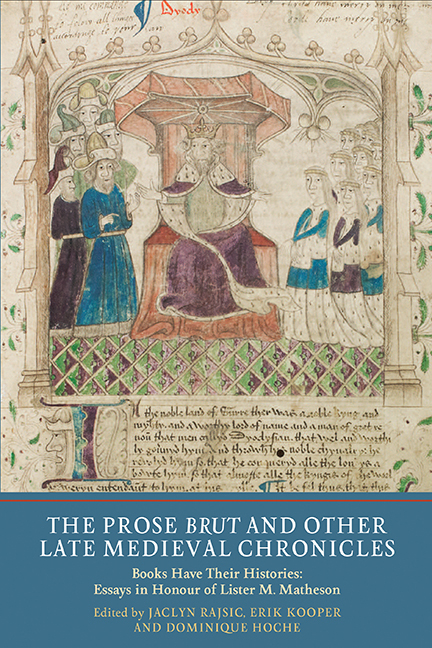 The Prose Brut and Other Late Medieval Chronicles
The Prose Brut and Other Late Medieval Chronicles Book contents
- Frontmatter
- Dedication
- Contents
- List of Plates
- List of Contributors
- Acknowledgements
- Curriculum Vitae of Lister M. Matheson
- Introduction
- A Memoir: The Whole Haggis: Lessons From the Work of Lister M. Matheson
- Part I Uses of History
- Part II The Prose Brut
- 5 Longleat House MS 55: An Unacknowledged Brut Manuscript?
- 6 Peculiar Versions of the Middle English Prose Brut and Textual Archaeology
- 7 The English Prose Brut Chronicle on a Roll: Cambridge, Corpus Christi College, MS 546 and its History
- 8 Re-Printing or Remaking? The Early Printed Editions of the Chronicles of England
- Part III Receptions and Afterlives of Late Medieval Chronicles
- Index of Manuscripts Cited
- General Index
- Tabula in Memoriam
5 - Longleat House MS 55: An Unacknowledged Brut Manuscript?
from Part II - The Prose Brut
Published online by Cambridge University Press: 05 July 2016
- Frontmatter
- Dedication
- Contents
- List of Plates
- List of Contributors
- Acknowledgements
- Curriculum Vitae of Lister M. Matheson
- Introduction
- A Memoir: The Whole Haggis: Lessons From the Work of Lister M. Matheson
- Part I Uses of History
- Part II The Prose Brut
- 5 Longleat House MS 55: An Unacknowledged Brut Manuscript?
- 6 Peculiar Versions of the Middle English Prose Brut and Textual Archaeology
- 7 The English Prose Brut Chronicle on a Roll: Cambridge, Corpus Christi College, MS 546 and its History
- 8 Re-Printing or Remaking? The Early Printed Editions of the Chronicles of England
- Part III Receptions and Afterlives of Late Medieval Chronicles
- Index of Manuscripts Cited
- General Index
- Tabula in Memoriam
Summary
IN his unsurpassed standard work on the Prose Brut chronicles, published in 1998, Lister Matheson discusses, or at least mentions, every manuscript then known to contain an Anglo-Norman, Latin or Middle English version of the text. Due to his thoroughness only a few manuscripts have since then been added to his list, for example by Lister himself and by Edward Donald Kennedy. But exactly because of that thoroughness we must assume that Matheson did in fact see the manuscript that is the subject of this essay: Longleat House MS 55; after all, he discusses Longleat 183A, a manuscript of the Common Version to 1419. Then why did he not include Longleat 55? It is the purpose of the present essay to try and shed some light on this.
MS Longleat 55
MS Longleat 55 is a parchment manuscript of sixty-eight folios generally known as Liber Rubeus Bathoniae (the Red Book of Bath), kept in the library of Longleat House in Wiltshire, the ancestral home of the marquesses of Bath. It contains thirtyeight texts mostly of historical, legal and ecclesiastical content, in Latin prose (the vast majority), Middle English and Anglo-Norman.
From the contents of the manuscript both its place of origin and the date of its production can be deduced with a fair amount of certainty: it was probably compiled in Bath for use by the town's magistrates between 1412 and 1430, and written almost in its entirety by one copyist, in a clear cursiva anglicana with Secretary admixtures. According to the Linguistic Atlas of Late Middle English the language of the Middle English pieces is predominantly southwestern, more precisely Somerset.
The text from this manuscript with which this essay is concerned is a Latin Prose Brut chronicle; it is preceded by a Latin genealogy of Mary and Christ, and followed by a Latin genealogical tree supporting the English claim to the French crown, with, on the same page, the three prerequisites for the just cause of war (Tria requirimenta ad iustum bellum). The main body of the manuscript consists of eight quires.
- Type
- Chapter
- Information
- The Prose Brut and Other Late Medieval ChroniclesBooks have their Histories. Essays in Honour of Lister M. Matheson, pp. 75 - 93Publisher: Boydell & BrewerPrint publication year: 2016
